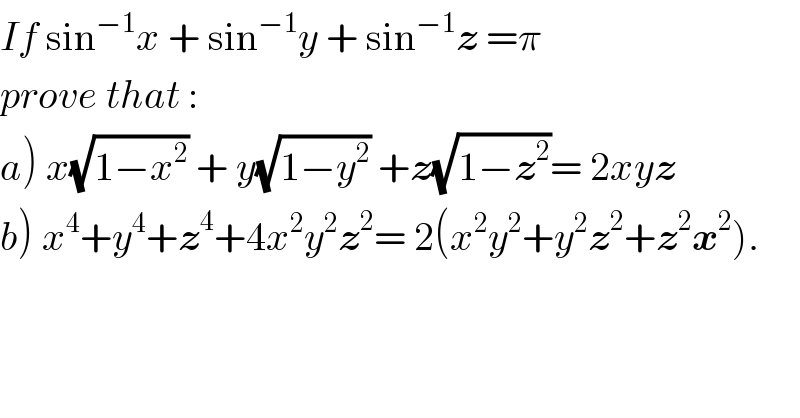
Question Number 44159 by rahul 19 last updated on 22/Sep/18

$${If}\:\mathrm{sin}^{−\mathrm{1}} {x}\:+\:\mathrm{sin}^{−\mathrm{1}} {y}\:+\:\mathrm{sin}^{−\mathrm{1}} \boldsymbol{{z}}\:=\pi\: \\ $$$${prove}\:{that}\:: \\ $$$$\left.{a}\right)\:{x}\sqrt{\mathrm{1}−{x}^{\mathrm{2}} }\:+\:{y}\sqrt{\mathrm{1}−{y}^{\mathrm{2}} }\:+\boldsymbol{{z}}\sqrt{\mathrm{1}−\boldsymbol{{z}}^{\mathrm{2}} }=\:\mathrm{2}{xy}\boldsymbol{{z}} \\ $$$$\left.{b}\right)\:{x}^{\mathrm{4}} +{y}^{\mathrm{4}} +\boldsymbol{{z}}^{\mathrm{4}} +\mathrm{4}{x}^{\mathrm{2}} {y}^{\mathrm{2}} \boldsymbol{{z}}^{\mathrm{2}} =\:\mathrm{2}\left({x}^{\mathrm{2}} {y}^{\mathrm{2}} +{y}^{\mathrm{2}} \boldsymbol{{z}}^{\mathrm{2}} +\boldsymbol{{z}}^{\mathrm{2}} \boldsymbol{{x}}^{\mathrm{2}} \right). \\ $$
Answered by tanmay.chaudhury50@gmail.com last updated on 22/Sep/18

$${sin}\alpha={x}\:\:\:{sin}\beta={y}\:\:\:\:{sin}\gamma={z} \\ $$$$\alpha+\beta+\gamma=\Pi \\ $$$$\left.{a}\right){LHS} \\ $$$${sin}\alpha{cos}\alpha+{sin}\beta{cos}\beta+{sin}\gamma{cos}\gamma \\ $$$$\frac{\mathrm{1}}{\mathrm{2}}\left({sin}\mathrm{2}\alpha+{sin}\mathrm{2}\beta+{sin}\mathrm{2}\gamma\right) \\ $$$$\frac{\mathrm{1}}{\mathrm{2}}\left\{\mathrm{2}{sin}\left(\alpha+\beta\right){cos}\left(\alpha−\beta\right)+\mathrm{2}{sin}\gamma{cos}\gamma\right\} \\ $$$${sin}\left(\Pi−\gamma\right){cos}\left(\alpha−\beta\right)+{sin}\gamma{cos}\gamma \\ $$$${sin}\gamma\left\{{cos}\left(\alpha−\beta\right)+{cos}\gamma\right\} \\ $$$${sin}\gamma\left\{\mathrm{2}{cos}\left(\frac{\alpha+\gamma−\beta}{\mathrm{2}}\right){cos}\left(\frac{\alpha−\beta−\gamma}{\mathrm{2}}\right)\right\} \\ $$$$\mathrm{2}{sin}\gamma\left\{{cos}\left(\frac{\Pi}{\mathrm{2}}−\beta\right){cos}\left(\frac{\alpha−\left(\Pi−\alpha\right)}{\mathrm{2}}\right\}\right. \\ $$$$\mathrm{2}{sin}\gamma{sin}\beta{cos}\left\{−\left(\frac{\Pi}{\mathrm{2}}−\alpha\right)\right\} \\ $$$${cos}\left(−\theta\right)={cos}\theta \\ $$$${so}\:\mathrm{2}{sin}\gamma.{sin}\beta.{sin}\alpha=\mathrm{2}{xyz}\:\:\:{proved} \\ $$
Commented by rahul 19 last updated on 22/Sep/18
thanks sir ����
Commented by peter frank last updated on 23/Sep/18

$${big}\:{up} \\ $$
Answered by math1967 last updated on 22/Sep/18
![a) let sin^(−1) x=A,sin^(−1) y=B,sin^(−1) z=C ∴sinA=x ,sinB=y ,sinC=z also A+B+C=π L.H.S x(√(1−x^2 )) +y(√(1−y^2 )) +z(√(1−z^2 )) =SinAcosA+sinBcosB+sinCcosC =(1/2)(sin2A+sin2B)+sinCcosC =(1/2)×2sin(A+B)cos(A−B)+sinCcosC =sinCcos(A−B)+sinCcosC [∵A+B=π−C] =sinC{cos(A−B)+cos(π−A−B)} =2sinCsinAsinB =2xyz=R.H.S prove](Q44167.png)
$$\left.{a}\right)\:{let}\:\mathrm{sin}^{−\mathrm{1}} {x}={A},\mathrm{sin}^{−\mathrm{1}} {y}={B},\mathrm{sin}^{−\mathrm{1}} {z}={C} \\ $$$$\therefore{sinA}={x}\:,{sinB}={y}\:,{sinC}={z} \\ $$$${also}\:{A}+{B}+{C}=\pi \\ $$$${L}.{H}.{S}\:{x}\sqrt{\mathrm{1}−{x}^{\mathrm{2}} }\:+{y}\sqrt{\mathrm{1}−{y}^{\mathrm{2}} }\:+{z}\sqrt{\mathrm{1}−{z}^{\mathrm{2}} } \\ $$$$={SinAcosA}+{sinBcosB}+{sinCcosC} \\ $$$$=\frac{\mathrm{1}}{\mathrm{2}}\left({sin}\mathrm{2}{A}+{sin}\mathrm{2}{B}\right)+{sinCcosC} \\ $$$$=\frac{\mathrm{1}}{\mathrm{2}}×\mathrm{2}{sin}\left({A}+{B}\right){cos}\left({A}−{B}\right)+{sinCcosC} \\ $$$$={sinCcos}\left({A}−{B}\right)+{sinCcosC} \\ $$$$\left[\because{A}+{B}=\pi−{C}\right] \\ $$$$={sinC}\left\{{cos}\left({A}−{B}\right)+{cos}\left(\pi−{A}−{B}\right)\right\} \\ $$$$=\mathrm{2}{sinCsinAsinB} \\ $$$$=\mathrm{2}{xyz}={R}.{H}.{S}\:{prove} \\ $$
Answered by math1967 last updated on 22/Sep/18

$$\left.{b}\right)\mathrm{sin}^{−\mathrm{1}} {x}+\mathrm{sin}^{−\mathrm{1}} {y}=\pi−\mathrm{sin}^{−\mathrm{1}} {z} \\ $$$$\mathrm{sin}^{−\mathrm{1}} \left({x}\sqrt{\mathrm{1}−{y}^{\mathrm{2}} }\:+{y}\sqrt{\mathrm{1}−{x}^{\mathrm{2}} }=\pi−\mathrm{sin}^{−\mathrm{1}} {z}\right. \\ $$$$\left({x}\sqrt{\mathrm{1}−{y}^{\mathrm{2}} }\:+{y}\sqrt{\mathrm{1}−{x}^{\mathrm{2}} }={sin}\left(\pi−\mathrm{sin}^{−\mathrm{1}} {z}\right)\right. \\ $$$${x}\sqrt{\mathrm{1}−{y}^{\mathrm{2}} }\:+{y}\sqrt{\mathrm{1}−{x}^{\mathrm{2}} }={z} \\ $$$$\left({x}\sqrt{\mathrm{1}−{y}^{\mathrm{2}} }\:\right)^{\mathrm{2}} ={z}^{\mathrm{2}} +{y}^{\mathrm{2}} −{x}^{\mathrm{2}} {y}^{\mathrm{2}} \:−\mathrm{2}{zy}\sqrt{\mathrm{1}−{x}^{\mathrm{2}} } \\ $$$$\left({x}^{\mathrm{2}} −{y}^{\mathrm{2}} −{z}^{\mathrm{2}} \right)^{} =\left(−\mathrm{2}{zy}\sqrt{\mathrm{1}−{x}^{\mathrm{2}} }\:\right)^{\mathrm{2}} \\ $$$${x}^{\mathrm{4}} +{y}^{\mathrm{4}} +{z}^{\mathrm{4}} −\mathrm{2}{x}^{\mathrm{2}} {y}^{\mathrm{2}} −\mathrm{2}{z}^{\mathrm{2}} {x}^{\mathrm{2}} +\mathrm{2}{y}^{\mathrm{2}} {z}^{\mathrm{2}} =\mathrm{4}{z}^{\mathrm{2}} {y}^{\mathrm{2}} −\mathrm{4}{x}^{\mathrm{2}} {y}^{\mathrm{2}} {z}^{\mathrm{2}} \\ $$$$\therefore{x}^{\mathrm{4}} +{y}^{\mathrm{4}} +{z}^{\mathrm{4}} +\mathrm{4}{x}^{\mathrm{2}} {y}^{\mathrm{2}} {z}^{\mathrm{2}} =\mathrm{2}\left({x}^{\mathrm{2}} {y}^{\mathrm{2}} +{y}^{\mathrm{2}} {z}^{\mathrm{2}} +{z}^{\mathrm{2}} {x}^{\mathrm{2}} \right) \\ $$$${Proved} \\ $$
Commented by rahul 19 last updated on 22/Sep/18
thanks sir ����
